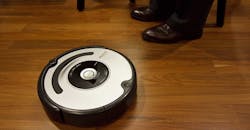IRobot Loses Bid to Halt SharkNinja Vacuum Sales During Suit
IRobot Corp. said it lost its bid to block upstart SharkNinja Operating LLC from selling a cheaper knockoff of its popular Roomba i7+ robotic vacuum cleaner while a patent-infringement lawsuit proceeds.
The ruling, by U.S. District Judge Allison Burroughs in Boston, came after iRobot argued that SharkNinja was copying patented features so it could undercut the i7+ by more than half its price just as the holiday shopping season approaches. IRobot said it was disappointed in the decision but is “fully committed to achieving a successful outcome” on both patent claims and a false advertising allegation.
“We believe strongly in the strength of our patents and in our case against Shark, and the court action will continue to trial on multiple iRobot patents,” iRobot said in a statement. “During the preliminary injunction hearing, Shark was forced to admit that its widespread claims that the Shark IQ Robot offers the same technological features as iRobot’s Roomba i7+ are untrue.”
Burroughs issued a sealed order and opinion, saying they contained information that the companies had filed with her under seal. She gave no indication how she had ruled or the reasons behind it. The judge told the parties to propose redactions by Dec. 13, according to a notice on the court docket.
IRobot, based in Bedford, Massachusetts, had asked that the Shark IQ be removed from the market “at the earliest possible date” without waiting for a trial. At a Nov. 13 hearing, iRobot accused SharkNinja of purposely copying features of the iRobot and then telling consumers the Shark is better than the Roomba.
Investors have grown wary about iRobot’s ability to grow its $1 billion in annual sales, particularly since the company gets half its revenue in the busy holiday shopping season. The company already is suffering as domestic sales have gotten caught up in the U.S. trade war with China. In October, the company abandoned plans to pass along tariff-related costs because it was hampering growth.
For American shoppers, the price difference is significant even without the tariffs. The Roomba i7+ sells for $999.99 on the company’s U.S. website; the Shark IQ Robot is for sale for $449.40 on SharkNinja’s site. The box touts that the Shark IQ has “more suction than the best-selling iRobot Roomba.”
Read More: Robot War Breaks Out as Roomba Maker Sues Upstart SharkNinja
The legal battle is over some of the patented features that made the i7+ one of Time magazine’s inventions of the year in 2018. It maps your home, schedules sweeps through each room, empties the dust bin itself and even knows where to resume cleaning after it has returned to its base for a recharge.
SharkNinja, a unit of closely held EP Midco LLC, denied using the inventions, and argued that iRobot was unlikely to win the case at trial.
IRobot has suffered as its domestic sales, which account for about half of its total revenue, have gotten caught up in the U.S. trade war with China. Analysts have grown cautious about the company, citing Shark’s aggressive pricing.
IRobot has been successful in using its patents against other competitors, while SharkNinja has prevailed against another formidable rival, Dyson Inc., whose patent-infringement allegations it defeated in 2018.
The case is iRobot Corp. v. SharkNinja Operating LLC, 19-12125, U.S. District Court for the District of Massachusetts (Boston).
About the Author
Bloomberg
Licensed content from Bloomberg, copyright 2016.
